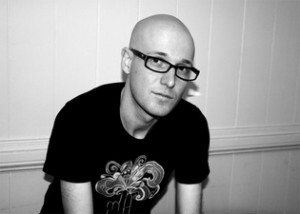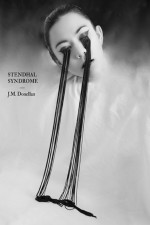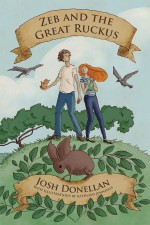Josh Donellan has a diverse representation in the Odyssey Books catalogue. His first book, Zeb and the Great Ruckus is a children’s book beloved by younger fans, while his recent anthology Stendhal Syndrome is a collection of poems, short stories, lists and rants. We sat down with the poet, musician, teacher and event manager to talk exploding toffee and all things words.

First things first. What have you been up to since Stendhal Syndrome came out?
I travelled around Europe for a bit, which was great. I’ve spent a lot of time in Portugal and revisiting it was magical. They have statues of poets in the town square, antiquarian bookstores open until midnight, and one bookstore which has been operating in the same building for more than 250 years. Amazing to think that people have been buying books from that store longer than Europeans have been in Australia. I was writing as well. It’s amazing how much work you can get done on high-speed trains whilst intermittently glancing at ruins, mountains and volcanoes.
I also helped out with the Queensland Poetry Festival SlammED program. I got to go to a bunch of high schools, help young poets develop their work and then host poetry slam comps. It’s always staggering to see how much intensity and honesty young poets have.

By night you’re also a slam poet. How does working with words in a more performative sense influence your writing?
By night, by day, while I’m asleep, when I’m stuck in traffic. I forget who it was that said ‘poetry isn’t a vocation, it’s a condition’, but I think that’s apt. The first art form I really seriously pursued was music, and I think that has a lot of influence on my writing. I like to see the text like a musician sees sheet music. The author sets the basic structure, but it’s up to the audience and their imaginations to see how the song really plays.
That’s why books are so special – the audience is a co-creator. I always read my work out loud to myself, character voices and all. It needs to have a life to it, a rhythm. I get a lot of that from the performance poetry, seeing how something seemingly simple like a long pause, some light repetition or a lowering of the voice can completely change a piece. I also spend a lot of time reading to children, I always do voices and get them to make sound effects, cheer and boo as the action progresses. I keep that idea of the audience’s reaction in the back of my head when I’m writing.
As we mentioned, you’ve got quite a diverse back catalogue, stretching from children’s books through to poetry. Why not stick to one genre?
I once stumbled upon an author website that stated ‘all of my books are detective books set in Paris in the 20s’ and I thought it was the craziest thing I’d ever read. I mean, sure, great era and location but as a fiction writer you get to write anything that has ever existed, might ever exist or currently exists only in the imagination. That’s an incredibly wide potential playing field. I know a lot of people think it’s strange to jump around genres, audiences etc., but a lot of great writers do it (Margaret Atwood, Neil Gaiman, Salman Rushdie).
I always say that a story is a soul and you need to find the right body for it to live in. Some things are going to work best as poems, plays, movies, video games, novels. Others might lend themselves comfortably to multiple forms. Also, I like to bounce around styles and genres for the same reason I like to travel, it’s that constant search for new ideas and experiences. Curiosity is key for a writer.
What do you feel are the main differences between writing novels and writing or performing poetry?
Poetry, particularly performance poetry, forces you to be succinct. You have to get right to the heart, lungs and liver of an idea fairly quickly. You also get to look the audience right in the eye as you perform and see if they’re responding to what you’re doing.
Novels, on the other hand let you unpack, unravel, reveal and revel over a long time. They each have their own fortes and frailties.
Children are a fickle audience, but something in the adventure and humour of Zeb and the Great Ruckus seems to strike a chord with them. What do you enjoy most about writing for children?
They are fickle, which is part of the fun and part of the challenge. I think what I love about writing for kids, and working with them, is that they’re so open to new ideas. As we get older we get set in our ways, and our imagination is like a muscle, if you don’t use it, it atrophies. You can stand in front of 30 kids and say “Let’s jump around and pretend we’re dinosaurs!” and they won’t even ask questions, they’ll just start roaring. Good luck getting grown-ups to do that (unless they’re drama students, I guess.) Kids have a sense of enthusiasm and curiosity that I think it would benefit us all to hold onto as we age. The world would be a much friendlier, more exciting place if we could do that.

Rants are a key part of Stendhal Syndrome. What’s your favourite topic to rant about right now?
We’re pretty spoilt for choice in terms of ranting topics in Australia right now.
We have a rapidly changing climate and a bunch of scientifically illiterate lawyers and businessmen in charge. We’re also one of the richest and most sparsely populated countries in the entire world spending billions of dollars each year keeping refugees locked up in torture camps because ‘we don’t have the money or space’ for them in Australia. It’d be hilarious if it wasn’t so soul destroying.
Tell us more about this irrational dislike for frangipanis.
About five years ago everyone had stickers of them on their cars and décor and it made me irrationally mad. It’s probably time to move on. There’s so many other things to dislike in the world!
What can fans expect to see next from you?
My last book is coming out in the USA soon, so I’m pretty excited about that, assuming the whole nation doesn’t crumple into an apocalyptic soup. I’ve also been working on a serial fiction podcast that I’m really thrilled about, we’ve just cast some amazing actors.
Once that’s done I’m going to write a collaborative novel with J.K. Rowling, Gillian Flynn, Paula Hawkins, Amy Schumer, George R. R. Martin and the ghost of Stieg Larsson. It’s going to be called The Gone Girl on the Train with the Lower Back Dragon Tattoo who Played A Game of Thrones With Harry Potter.
Describe your writing style in three words.
Exuberant, quixotic, unlikely to conform to specific parameters and guidelines e.g. word counts.